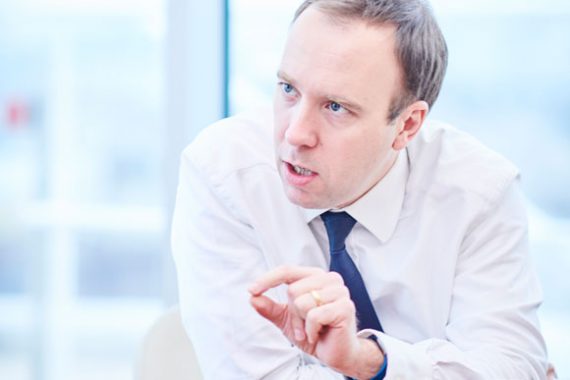Health secretary Matt Hancock has supported the proposals from NHS England to pay the pensions tax of GPs and consultants – but warns that details need to be clarified.
He said that the current proposals could potentially constitute ’tax avoidance’.
Under the proposals, GPs would elect ’scheme pays’, which would normally mean that the tax charge would be taken out of the final pension. However, under these proposals, the final pension would not be reduced.
NHS England has confirmed that clinicians will be ’fully compensated’, meaning the exemption applies to any work that results in a tax charge being applied in 2019/20 – not just additional shifts.
’For clinicians who would ordinarily expect to receive a charge before any additional work is undertaken, you will be able to elect for the nationally backed scheme pays offer for the full tax charge,’ NHS England confirmed in an FAQ document.
However, the document stated that the scheme will not cover tax charges on any non-NHS work.
In a letter sent on 18 November, NHS England chief executive Simon Stevens wrote to the health secretary proposing a commitment to pay GPs pensions tax charges to support staffing during the winter period.
He said: ’There is an urgent operational requirement to remediate further the situation, so as to try and remove barriers to needed clinical staffing over the winter period.
’To that end, as you know, we have been working with your officials and HMT on an in-year mitigation. This will involve a commitment to make payments to certain clinical staff outside of the NHS pension schemes to restore the value of their pension benefits package, if they have elected to use the “Scheme Pays” facility to settle an annual allowance tax charge arising from of their pension saving in the NHS schemes in 2019/20.’
Mr Hancock replied to Mr Stevens, saying that he agreed the proposals are ’operationally necessary’ but that the scheme could constitute as tax avoidance.
He said: ’I accept your judgement too that this cannot wait until after the general election, and on that basis I am advised that its announcement is compatible with pre-election guidance.
’As you set out, the proposals which you plan to introduce for “scheme pays” for the 2019/20 tax year constitutes an example of tax planning. Depending on the detail of how you put the proposed approach into practice, the scheme could constitute tax avoidance. In deciding on this detail, you should seek to minimise this risk.’
RCGP chair Professor Helen Stokes-Lampard said she is ‘relieved’ that NHS England and the Department of Health and Social Care are joining forces to address the pension tax crisis.
However, she added: ’The proposals outlined are only a partial fix, not a long-term solution. Self-employed GPs, who manage their tax through self-assessment, will need additional information and guidance in order to access this support. Extra funding will also be needed so that it can be extended to GPs and other clinicians working across the other nations of the UK.
’In the longer-term, we need a comprehensive solution that can be easily applied to all professionals in both primary and secondary care. Given the complexity of the system already in place, this needs to focus on urgently reforming the tax system so that all GPs are fairly treated.’
Rachel Hall, head of medical services at Sandringham Medical Financial Planning, said the news will be ‘warmly’ received by doctors who can return to work but added that it is a shame that non-clinical roles have been disregarded.
She added: ‘The Government is kicking the can down the road and we need to see some robust actions implemented immediately, which would be more effective if they simply ended the tapering of the annual allowance.’
Andrew Pow, executive board member of the Association of Independent Specialist Medical Accountants (AISMA), said: ‘It is important that doctors understand that the proposals relate only to their 2019/20 tax payments. Those with large annual allowance tax charges for 2018/19 will still need to pay these in January 2020.’
NHS England has also confirmed it will work through a ’detailed implementation mechanism’ with GPs and GP representatives to achieve the ‘intended’ benefits.
Pulse October survey
Take our July 2025 survey to potentially win £1.000 worth of tokens













